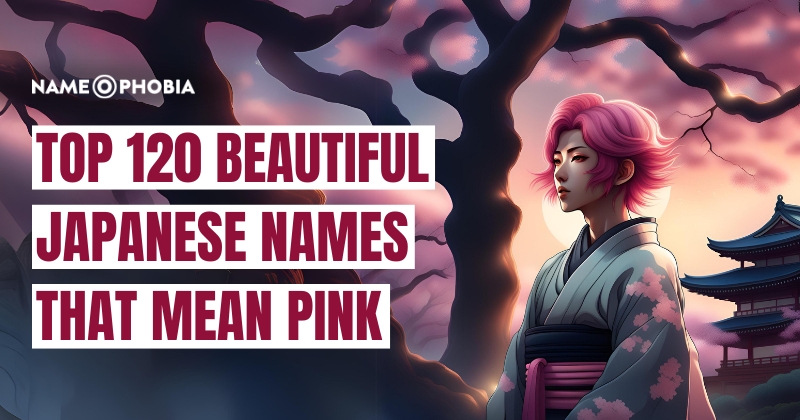In Japan, pink symbolizes beauty, youth, and new beginnings, often linked to cherry blossoms.
If you’re looking for Japanese Names That Mean Pink, these names capture the soft, elegant feel of the color.
Whether for a baby, character, or pet, Japanese Names That Mean Pink add charm and meaning, reflecting kindness and grace.
Let’s explore how these names can bring a special touch to your choices, showing why Japanese Names That Mean Pink are cherished in Japanese culture.
The Role of Pink in Japan’s Culture
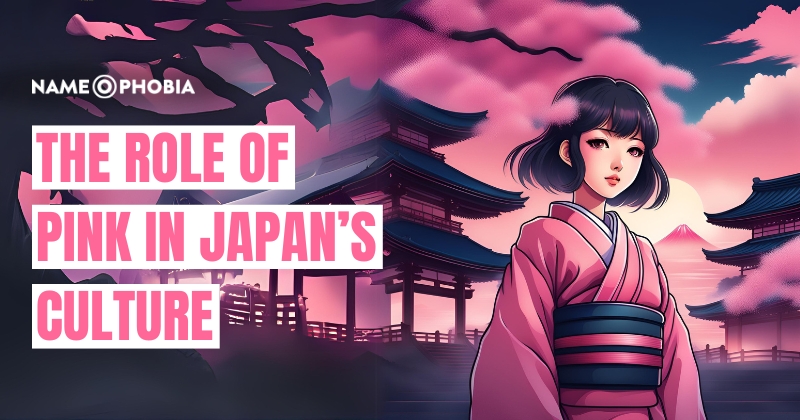
In Japan, pink is a color that represents beauty, softness, and the idea that life is short but precious.
This connection comes from cherry blossoms, or “sakura,” which bloom briefly each spring.
These flowers are very important in Japanese culture, reminding people to cherish the present.
This love for pink influences art, fashion, and even the way people choose names, like Japanese Names That Mean Pink.
Parents often choose Japanese Names That Mean Pink for their children because pink symbolizes youth and grace.
For example, the name “Momoka,” which means peach blossom, brings to mind delicate pink flowers and embodies a sense of beauty.
These names aren’t just pretty; they have deeper meanings related to nature and hope, making Japanese Names That Mean Pink special in Japanese naming traditions.
Today, pink is still a popular and positive color in fashion and pop culture in Japan.
When parents pick Japanese Names That Mean Pink, they’re giving their children names that are not only beautiful but also connected to a rich cultural history.
These names celebrate beauty, nature, and the special moments in life, showing how Japanese Names That Mean Pink continue to be meaningful and cherished.
Also Check: Japanese Names That Mean Snow
Boys Japanese Names That Mean Pink
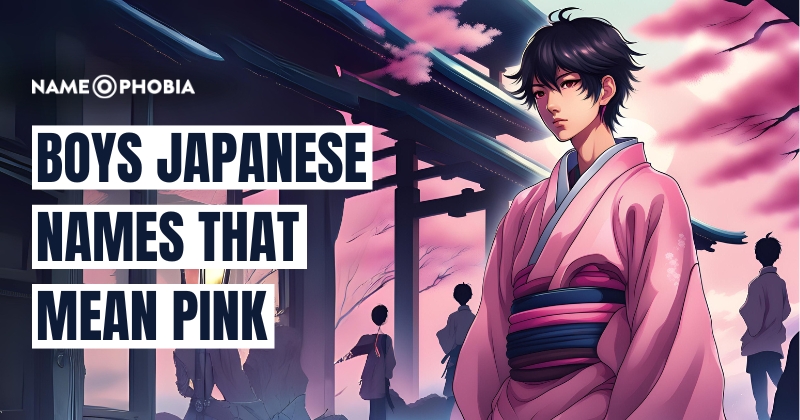
Check out boys Japanese names that mean pink, each capturing the soft and pretty vibes of the color.
- Sakura (桜): Cherry Blossom
- Raku (楽): Joyful, Happiness (associated with the cheerful color of pink)
- Hikaru (光): Light (can represent a soft pink light)
- Aoi (青い): Blue (sometimes used in a context where blue and pink are contrasted, though not directly meaning pink)
- Kaito (海斗): Ocean and Fight (often associated with pink sunsets over the ocean)
- Haruto (陽翔): Sunlight and Soar (can imply the warm, pinkish light of sunrise)
- Shin (真): True or Real (symbolizing true or pure pink)
- Tsubasa (翼): Wings (pink often symbolizes the lightness and freedom of wings)
- Haru (春): Spring (spring is associated with pink cherry blossoms)
- Sora (空): Sky (pink hues are seen in the sky during sunrise and sunset)
- Ren (蓮): Lotus (though often associated with other colors, the pink lotus is significant)
- Ryota (良太): Good and Thick (can symbolize the warmth of pink)
- Kaoru (薫): Fragrance (pink flowers often have a pleasant fragrance)
- Yoshiki (良輝): Good and Radiance (implies the soft radiance of pink)
- Natsu (夏): Summer (pink is often seen in summer flowers and sunsets)
- Yuto (悠斗): Distant and Fight (the soft pink of distant horizons)
- Kazu (和): Harmony (the soothing quality of pink)
- Shinobu (忍): Endurance (implies the resilience often associated with the enduring beauty of pink flowers)
- Atsushi (篤志): Sincerity and Intention (a sincere and gentle pink)
- Takumi (匠): Artisan (crafting beautiful pink items)
- Ryo (涼): Cool (often used for cool, soothing pink tones)
- Daiki (大輝): Big and Radiance (the bright, prominent color of pink)
- Jin (仁): Benevolence (gentle and kind like pink)
- Kenta (健太): Healthy and Big (associated with vibrant pink health and vitality)
- Haruki (春樹): Spring Tree (pink blossoms of spring trees)
- Masa (正): Correct (the purity and correctness of pink)
- Eiji (英治): English and Reign (pink can be regal and noble)
- Shota (翔太): Soar and Thick (implies the expansive quality of pink skies)
- Kohaku (琥珀): Amber (the warm, pinkish hue of amber)
- Yuji (優司): Gentle and Director (the soft, gentle nature of pink)
- Riki (力): Strength (pink as a symbol of gentle strength)
- Tomo (智): Wisdom (wisdom associated with the calming effect of pink)
- Nori (則): Rule (the standard or rule of pink beauty)
- Yuuto (優斗): Gentle and Fight (a gentle pink hue)
- Tomoaki (智明): Wise and Bright (bright pink)
- Miyu (美優): Beautiful and Gentle (pink is often seen as beautiful and gentle)
- Hiro (広): Wide (the wide range of pink shades)
- Kazuya (一也): Harmony (the harmonious nature of pink)
- Shinji (真司): True and Child (true, gentle pink)
- Ryoji (良司): Good and Director (a soft, good pink)
Also Check: Japanese Names Meaning Dark
Girls Japanese Names That Mean Pink
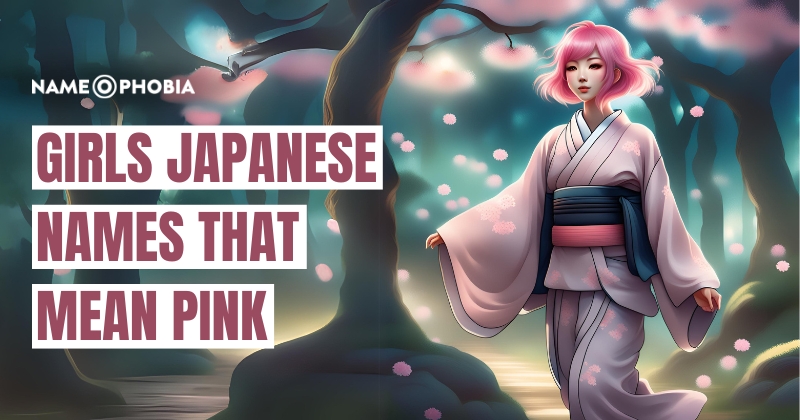
Japanese Girl Names That Mean Pink lists names that capture the beauty and softness of the color pink, reflecting grace and charm in a simple, easy-to-understand way.
- Asuka (飛鳥): Flying Bird (can evoke the image of flowers in flight)
- Kiyoko (清子): Pure Child (implies a delicate, soft quality)
- Momo (桃): Peach (a common symbol of soft pink hues)
- Sayaka (さやか): Clear, Radiant (often associated with soft pink tones)
- Yuzuki (由月): Gentle Moon (subtle and calming, like a pink moon)
- Fumiko (文子): Child of Letters (can suggest beauty in simplicity, including floral themes)
- Hina (雛): Chick (sometimes associated with soft, pastel colors)
- Rina (里奈): Village Apple (suggests a gentle, sweet color)
- Miyuki (美由紀): Beautiful Happiness (a warm, pleasant tone)
- Hana (花): Flower
- Satsuki (五月): May (when many flowers bloom)
- Akari (灯り): Light (often associated with a gentle, pinkish glow)
- Yui (由依): Bind, Connect (can symbolize the way flowers connect with nature)
- Tsubaki (椿): Camellia (a flower that can come in various pink shades)
- Nanako (菜々子): Vegetable Child (suggesting a softer, earthy pink)
- Harumi (春美): Spring Beauty (evoking the image of pink spring flowers)
- Aoi (葵): Hollyhock (can also imply blue, but sometimes used for softer tones)
- Mikako (美佳子): Beautiful and Excellent Child
- Natsumi (夏美): Summer Beauty (suggesting the colors of summer flowers)
- Yoko (陽子): Sunshine Child (soft, warm hues)
- Koharu (小春): Little Spring (springtime often includes many pink flowers)
- Riko (莉子): Jasmine Child (jasmine can be associated with soft pink)
- Yuri (百合): Lily (a flower that can be pink)
- Momoha (桃葉): Peach Leaf (hinting at the peach blossom color)
- Yuna (由奈): Gentle, Graceful
- Hinata (日向): Sunny Place (can be related to sunlit flowers)
- Kaori (香): Fragrance (often associated with pleasant floral scents)
- Hikari (光): Light (often associated with soft pink light)
- Yoshino (吉野): Lucky Field (a place where cherry blossoms may bloom)
- Emi (恵美): Beautiful Blessing
- Kohana (小花): Small Flower
- Ayane (彩音): Colorful Sound (can imply vibrant floral colors)
- Mizuki (水月): Water Moon (soft, cool pink tones)
- Sakura (桜): Cherry Blossom
- Haruka (遥): Distant, Faraway (soft pink hues as seen in distant horizons)
- Yuika (由衣花): Reason, Clothing Flower
- Sumire (菫): Violet
- Miyako (美夜子): Beautiful Night Child
- Kohaku (琥珀): Amber (can have pinkish hues)
- Mina (美奈): Beautiful and Gentle
Unisex Japanese Names That Mean Pink
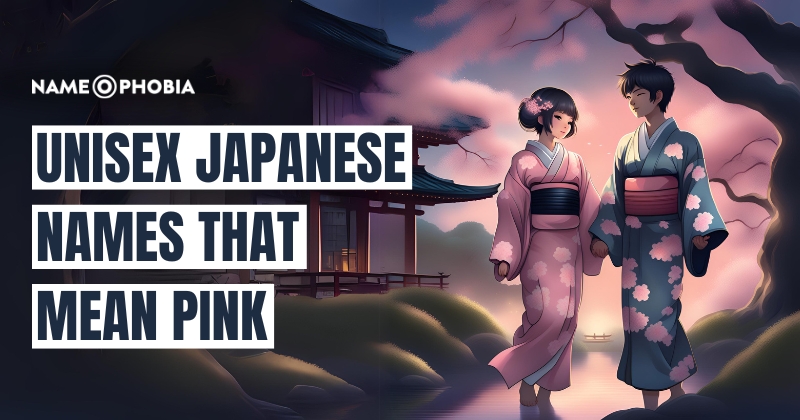
Unisex Japanese names that mean pink are inspired by the color’s beauty and warmth, often drawing from nature and cultural symbols.
- Kikumi (菊美) – Chrysanthemum Beauty
- Ami (亜美) – Asia Beauty
- Momoko (桃子) – Peach Child
- Saki (咲) – Bloom
- Yuriko (百合子) – Lily Child (lilies can be pink)
- Hina (ひな) – Doll (often dressed in pink)
- Kohana (小花) – Small Flower
- Mei (芽衣) – Sprout Clothing (soft pink imagery)
- Ruka (瑠花) – Lapis Lazuli Flower
- Miku (美空) – Beautiful Sky (can evoke pink sunrise)
- Rina (里奈) – Village Nara
- Emiko (恵美子) – Child of Beauty and Blessing
- Sayaka (沙耶香) – Sand, Fragrance
- Mina (美菜) – Beautiful Vegetables
- Yui (唯) – Only
- Nami (波) – Wave (soft pink of dawn)
- Yuzuki (柚月) – Yuzu Citrus Moon
- Hikari (光) – Light
- Kyo (京) – Capital (soft pink can be associated with old capital cities)
- Aoi (葵) – Hollyhock (can suggest pink hues)
- Riko (理子) – Child of Reason
- Kanade (奏) – Musical Sound
- Nana (菜々) – Vegetables
- Akira (明) – Bright
- Hinata (日向) – Sunny Place (soft pink imagery)
- Hana (花) – Flower
- Aki (秋) – Autumn (can be associated with pink autumn leaves)
- Rika (里香) – Village Fragrance
- Sumi (澄) – Clear
- Kaho (花穂) – Flower Spike
- Koharu (小春) – Little Spring (soft pink)
- Ayumu (歩夢) – Walking Dream
- Nao (尚) – Esteem
- Suzu (鈴) – Bell
- Haruka (春香) – Spring Fragrance
- Maho (真帆) – True Sail
- Miyu (美優) – Beautiful Excellence
- Riko (理子) – Child of Reason
- Shizuku (雫) – Droplet (can suggest pink dew)
- Yuuka (優花) – Gentle Flower
Also Check: Japanese Names That Mean Fire
Conclusion
When you look at Japanese names that mean pink, you’re diving into a world where color and culture blend beautifully.
Names like Sakura, which means cherry blossom, highlight the delicate and lovely side of pink.
Choosing Japanese names that mean pink isn’t just about picking a pretty color, it’s also about connecting with a tradition that values beauty and grace.
These names give a special touch to anyone who has them, reflecting a piece of Japanese culture.
So, if you’re thinking about Japanese names that mean pink, you’re not just choosing a name, but also celebrating something really meaningful and beautiful.
